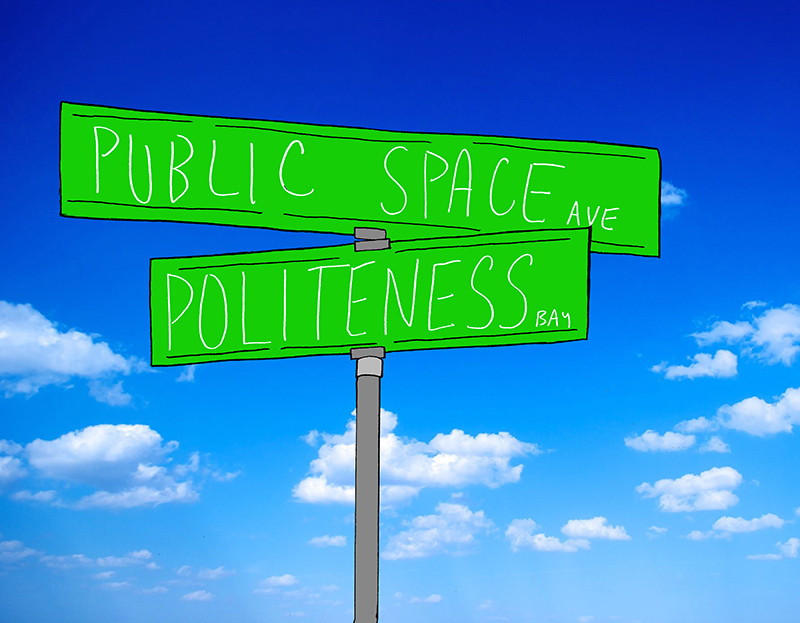The Intersection with Jodie Layne
How to be a decent human being now that it’s warm(er)
As almost any good Winnipegger knows, we live for the tiny window of months in the year that we can leave the house without a jacket or wear a dress without tights underneath. For the less daring of us, it’s also time to pull our bikes out of the basement and roll around town on our own two wheels.
It’s, unfortunately, also a time where body-shaming and talk of ‘bathing suit season’ are at an all-time high. Put more folks on the streets more often and you get much more street harassment. It’s almost summertime and people have bodies. These two things seem to have a really hard time coexisting.
I don’t want to have to write this article, really I don’t. However, the behaviour I experience and hear about every summer shows me that I have to. YOU HAVE FORCED MY HAND, CITIZENS. The number of times I have had to remind people that it’s not okay to call women ‘baby’ or had to call the cops with a license plate number after a driver felt it was okay to whistle at me out the window is almost as obscene as some of the things that are said to me and countless others regularly.
One thing people like to claim as an excuse is that they ‘didn’t know better’. Well, I’m going to give you some handy tips on how to interact with other human people, so now you know better. For those of you who feel like it’s ‘not your problem’ because you don’t participate in that behaviour - stop right there before you give yourself a ‘good person’ badge. If you’re not actively challenging these behaviours, you’re part of the problem. Silence is complicity.
First, it’s not okay to make comments about or touch someone’s body - even if it’s what you construe as a positive way. We’re all different bags of skin walking around with all of our different life experiences and values systems. What might be complimentary or affirming to you might be someone else’s triggering or offensive. If you feel like you MUST comment on someone else’s visible self, make sure it’s something specific that they have control over like a book they’re reading or their sense of style or a simple and generic ‘You look nice today!’ keeps the creepiness on the sidelines. Remember that just because people move about in a public space, it doesn’t mean that THEY are a public space - no matter how much clothing they are or aren’t wearing, what time of day it is, or how much you feel like you want to compliment their butt. Keep it to yourself.
This goes for people whose gender presentation might not be what you’re used to seeing. You’re an adult, you can handle it. Calling someone a ‘tranny’, ‘thing’, ‘he/she’, ‘it’ or asking people if they’re a boy or a girl is straight-up wrong. If you’re referring to someone or engaged in a conversation with someone whose presentation is ambiguous to you, ask which pronouns they would like used. Gender is complicated and no one owes you an explanation.
Next - never comment on someone else’s weight ever. EVER. Okay? The clothes we tend to wear in our warmest season are usually minimal in order to deal with the heat and clingy humidity. This means we see a lot more of each other’s bodies and might reveal someone’s winter weight loss or weight gain. This may trick you into thinking you get to comment on it. You would be wrong. Whether you think someone’s too fat for that dress/swimsuit/tuxedo/whatever or whether you feel the need to let them know that you envy their slimness or jokingly spill you ‘hate them for being such a skinny bitch’, the answer is no. Weight gain and loss and people’s body sizes are the result of a whole host of factors, none of which are immediately visible to the eye. It’s hard enough being fat, skinny, curvy, slim, potbellied, flat, hippy, busty, or ANY body in this culture without friends and strangers bringing it to our attention. Trust us, we are already hyperaware.
Being in the sun brings out all kinds of reactions in our melanin. Some people get darker, some people get freckles, and we all know that person who refuses to learn and gets a ‘base burn’ and goes right to bright red. Regardless of this, DO NOT - under any circumstances - ask or tease Indigenous people or people of colour about their skin. If you want to know if black people can get sunburns, ask the Internet. Seriously, Google that shit instead of putting someone on the spot about their skin color.
With these simple tips and a little mindfulness, you’re all set to exist in public as a human being this summer! Now, can I give you a compliment? You look really great today.
Jodie Layne is a feminist activist, community development worker and freelance writer based in Winnipeg.
Published in Volume 68, Number 26 of The Uniter (May 7, 2014)







